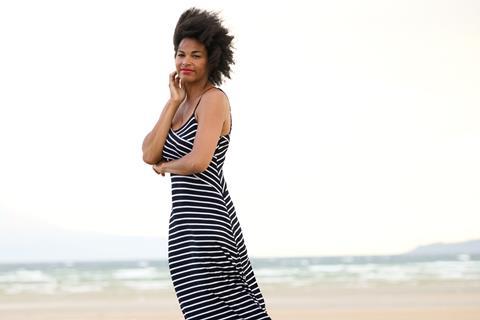Hope Bonarcher admits she struggles with the impact of growing older
I feel old and ugly. There, I said it. I’m probably not supposed to write that in a Christian magazine, but it’s reality, as I feel it, captured here in black and white. Maybe I’m too self-critical – my background in modelling, the decades of being visualised in terms of physical presentation on a monetary scale, has me laser-focused on the outside.
Feeling unprepared
It’s not my beauty that’s fading so much as my youth, and all the references to beauty that go along with it. Turning 40 was more emotionally challenging than I’d imagined. It happened over Covid lockdown, so the celebrating and festivities I’d looked forward to were demoted to ordering takeaway with my husband from a Glasgow Vietnamese restaurant and eating alone together in a vacant Airbnb. There were ambient balloons, at least. Aside from the deflated experience, the number (40) and all its baggage didn’t match the image staring back in the mirror. There was an odd, illusionary element.
I can dress it up any way I like it, but the truth is, I’m ageing and I can’t control it
Now at 45, the slipping away of the illusion makes the fate of ageing more real, hence my heightened tinge of melancholy. My underchin poofs, no matter how I crane my neck. I’m constantly thinking there’s fuzz in my dark afro, only to realise it’s another strand of grey. My eyebrows are thinner. I’m beginning to slightly resemble relatives whose looks I never cared for. I’m not out of shape: I walk daily, strength train, do Pilates, fast regularly and don’t indulge in problematic food groups. However, I can dress it up any way I like it, but the truth is, I’m ageing and I can’t control it. I’ve arrived here unprepared, despite all its inevitability.
How should we dress in middle age?
Upon this revelation, I ask myself: Should women of a certain age change the way we dress? The answer is apparent. In general, women over 45 and under aren’t interchangeable in our fashions. Could the recent age malaise I’ve experienced be the culprit? Do women give up when we reach our 40s and 50s, when our bellies achieve their telltale bulge, without Spanx, after even a fistful-sized meal? What follows is a small personal anecdote.
Out shopping with my teenaged daughter, we made a beeline for the sales rack. She smiled excitedly, and picked up a pink, ditsy floral dress.
“Mom, you should get this! It’s so cute! Over jeans, even? It’s only
a fiver…”
Later at home, I tried it on and turned my nose up.
“It’s kind of tight.”
“No, it’s not, Mom.”
“It’s too short.”
“Not with jeans! You could cut it into a top. But you don’t have to. I like it!”
“Maybe not for a 45-year-old…”
The corners of my mouth sagged, along with a bit of my spirit. My daughter’s usual retort went unspoken. People often mistake me for her older sister. No one ever guesses my age. It’s clear, the source of the issue resides in me. I’m uncomfortable with the reality and result of ageing.
After concluding the fit of the dress wasn’t so bad, especially for an unusually scorching day in Scotland, it stayed on, over jeans. It wasn’t long before the sweat set in, raising my anxiety. It was acceptable as a tunic, but as a mid-thigh grazing frock, I’d feel conspicuous, even in a balmy 26 degrees. The safety layer remained, but the understanding of my place in the world as a middle-aged woman waivered.
My 78-year-old mother-in-law, a Christian and herself a former model, has often said to me: “Once you’re old, you become invisible.” I’m not ready to be invisible yet. Is that wrong? Is it sinful? Looking down at the mini-dress, I don’t think my husband would disapprove, especially in our own garden, given the heat. But alone, on a crowded city street, I’d feel iffy. Is that the Holy Spirit, wisdom, discernment or just personal taste?
“People are like grass; their beauty is like a flower in the field. The grass withers and the flower fades” (1 Peter 1:24, NLT). I’m not just simplifying heartfelt feelings with oft-heard Bible verses. These truths are inherent in the reality of fallen creation – biblical and also scientific. We can respond to the inevitable slow death of ageing with either humble acceptance or defiant delirium.

A value beyond our years
The message of the world says women are to be consumed. When you feed others with visual stimulation, like a shiny apple, you’re worthy. The public adores you; men desire you; these days men and women want to be you. Once aged imperfection sets in, you’re no longer covetable.
In Christ, God gives us value that’s imperishable. My daughter winced a little when I was criticising myself in the sundress. To her, my value doesn’t come from squeezing into a garment, but from carrying her in my womb for nine months and the words of life I build her up with when she’s down. My husband, a photographer, surrounded by gorgeous models at work, doesn’t remain faithful because I haven’t wrinkled up yet, but because of our oath together, the family lineage we’re raising, the nonstop laughter we get up to when the rest of the house is asleep. My friends wouldn’t trade my loving texts or out-of-the blue bursts of encouragement for a cinched waist.
Jesus has granted us eternal value even while outwardly we are perishing. Just before that oft-quoted verse from 1 Peter, the apostle writes this: “You were cleansed from your sins when you obeyed the truth, so now you must show sincere love to each other as brothers and sisters. Love each other deeply with all your heart. For you have been born again, but not to a life that will quickly end. Your new life will last forever because it comes from the eternal, living word of God” (vv22-23). Yes women, we are both parts perishable and imperishable. May God give us the grace and wisdom to keep focused on that which lasts for eternity.


































1 Reader's comment